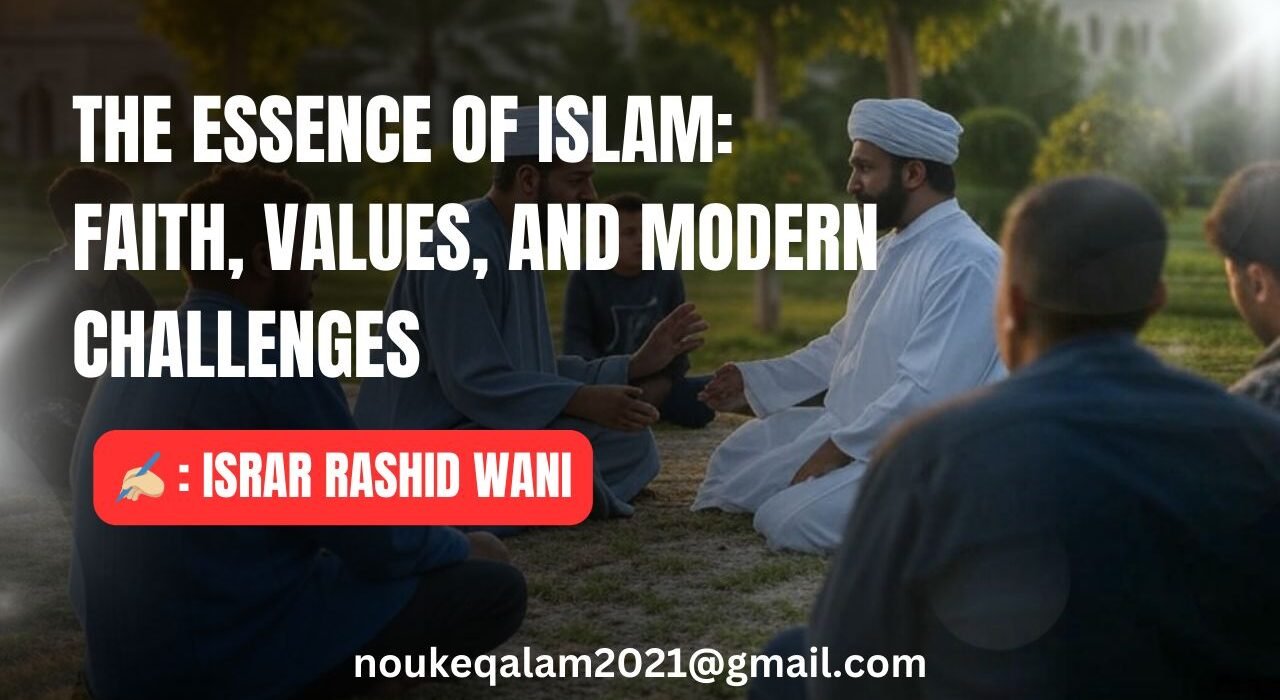Islam is a monotheistic religion that teaches the belief in Allah and the Prophethood of Muhammad (SAW). The term Islam itself means “submission,” reflecting the idea of submitting to the will of Allah.
Islam is peace, a way so true,
Submission to Allah, with heart anew,
Guided by Qur’an, and Prophet’s light,
A path of righteousness, day and night.
Throughout history, Islam has contributed significantly to various fields, including science, medicine, philosophy, and the arts. Islam teaches that life has a purpose, which is to worship Allah and live according to His guidance.
Islam emphasizes the importance of doing good deeds, whether through acts of charity (zakat), kindness, or helping others. The teachings of Islam highlight Allah’s mercy and forgiveness. This encourages individuals to seek repentance and strive to improve themselves, knowing that they can always start anew. Belief in the Day of Judgment and the hope for eternal life in paradise serve as powerful motivators for Muslims to lead a righteous life and make choices that align with their faith.
Islam encourages self-reflection and personal growth. The practice of prayer (salah) and reading the Qur’an can inspire individuals to develop their character and strengthen their relationship with Allah.
The Role of Women in Islam
Hazrat Khadija
A symbol of intelligence and compassion, Hazrat Khadija was the wife of Prophet Muhammad (SAW) and the first woman to accept Islam. She was a successful businesswoman, known for her intelligence, wisdom, and compassion.
Hazrat Khadija was a wealthy merchant who traded goods within the Arabian Peninsula and beyond. Her business acumen and leadership skills earned her the respect of her contemporaries.
Hazrat Khadija’s life is a testament to the fact that women can excel in any field they choose. She was a devoted wife, mother, and entrepreneur who balanced her personal and professional life with ease. Her support and encouragement played a vital role in the Prophet’s mission, and she remains an inspiration to Muslim women around the world.
Hazrat Fatima
Hazrat Fatima was the daughter of Muhammad (SAW). She was a symbol of piety, modesty, and kindness.
Hazrat Fatima was known for her exceptional beauty, both inner and outer. She was a devoted daughter, wife, and mother who dedicated her life to serving Allah and her family.
Hazrat Fatima’s life is a shining example of the values that Islam emphasizes—compassion, kindness, and humility. She was a strong and independent woman who stood up against adversity. Her courage and resilience serve as a powerful inspiration to Muslim women around the world.
The Situation of Today’s Women
Unfortunately, many women today are trapped in destructive habits, including drugs, gambling, online games like BC, Dream 11, and other forms of entertainment that are totally haram in Islam. These vices are not only harmful to their physical and mental health but also erode their dignity and self-respect.
As Muslims, we know that Allah has created us to live a purposeful life. But when we are trapped in destructive habits, we lose sight of our purpose and our connection with Allah.
We need to create a supportive environment where women feel comfortable seeking help. We need to encourage them to speak out and seek professional help. We need to educate ourselves and our communities about the dangers of destructive habits. We need to raise awareness about the risks and consequences of these habits and promote healthy alternatives.
We need to promote Islamic values and principles that emphasize the importance of self-care, self-respect, and self-worth. We need to pray for our sisters who are trapped in these destructive things.
The Danger of Haram Activities
Haram activities are those that are forbidden or prohibited in Islam. They include actions such as:
Consuming intoxicants, such as alcohol and drugs.
Engaging in illicit relationships.
Gambling or participating in games of chance.
Lying, cheating, or deceiving others.
Haram activities create a barrier between us and Allah (SWT), making it difficult for us to feel connected to Him. Haram activities can lead to a decline in our faith and a weakening of our spiritual resolve.
How to Keep Ourselves Safe from Haram Activities?
Learn about Islam and the Qur’an to understand what is halal and what is haram. Pray to Allah for guidance, strength, and protection from haram activities.
Today’s Youth Beyond the Degree
In today’s fast-paced world, we often find ourselves caught up in the pursuit of material success and academic achievements. While education is essential, we must not forget our Islamic values and principles. Many of our youth are so focused on obtaining their degrees and securing high-paying jobs that they neglect their Islamic duties and responsibilities.
They spend countless hours studying and working, but hardly make time for reading the Qur’an, performing salah, or engaging in other Islamic activities.
This is indeed a sad state of affairs. Our youth are the future leaders of our Ummah, and it is imperative that they are grounded in Islamic knowledge and values.
When we forget our Islam, we risk losing our identity and purpose in life.
“We become like a ship without a rudder,
Drifting aimlessly in the ocean.”
Forgetting our Islam also leads to a decline in our moral values and principles.
Today’s Youth Beyond the Degree and Forgetting Our Islam
Today’s youth study with a single aim,
To become professionals and earn a name,
But in the process, they forget the way,
To cultivate humanity and seize the day.
Their minds are filled with facts and figures bright,
But lack the warmth of empathy and gentle light,
They chase the dream of wealth and status high,
But leave behind the beauty of kindness and a gentle sigh.
Their hearts are driven by ambition’s fire,
But neglect the gentle touch of love and desire,
They have lost the essence of Islam’s might,
And traded humanity for a professional light.
Let us not forget the true purpose of education’s call,
And strive to become better human beings, one and all.
The Power of the Qur’an, Namaz, and Dua
As Muslims, we are blessed with three powerful tools that can transform our lives and bring us closer to Allah: the Qur’an, Namaz, and Dua.
The Power of the Qur’an
The Qur’an is the word of Allah, revealed to Prophet Muhammad (PBUH) over 1,400 years ago. It is a book of guidance, wisdom, and healing that has the power to transform our lives.
“The Qur’an is healing for the diseases of the heart” (Hadith, Bukhari).
“The Qur’an is guidance for those who fear Allah” (Qur’an 2:2).
The Power of Namaz
Namaz is the obligatory prayer that Muslims perform five times a day. It is a means of connecting with Allah, seeking forgiveness, and finding peace and tranquility.
“Namaz is the pillar of Islam” (Hadith, Bukhari).
“Establish Namaz, and you will be successful” (Qur’an 23:2).
The Power of Dua
Dua is the act of supplicating to Allah, seeking His help, guidance, and forgiveness.
“Dua is the essence of worship” (Hadith).
“Call upon Me, I will answer you” (Qur’an 40:60).
“The Qur’an is guidance,
Namaz is a pillar,
And Dua is a means of connecting with Allah” (Hadith, Ibn Majah).
May Allah guide us and grant us the strength to practice these powerful tools in our daily lives.
Oh Dear Kashmiri Youth!
Let us not forget the teachings of our beloved Muhammad (SAW) and the principles of our beautiful faith. Islam is the path that guides us toward righteousness, justice, and compassion.
“Let’s Return to the Righteous Path”
Success will only come when you choose the path of righteousness.
(The writer is student of Grade 12)
(Edited by :. Ikkz Ikbal Nouk-e-qalam)





